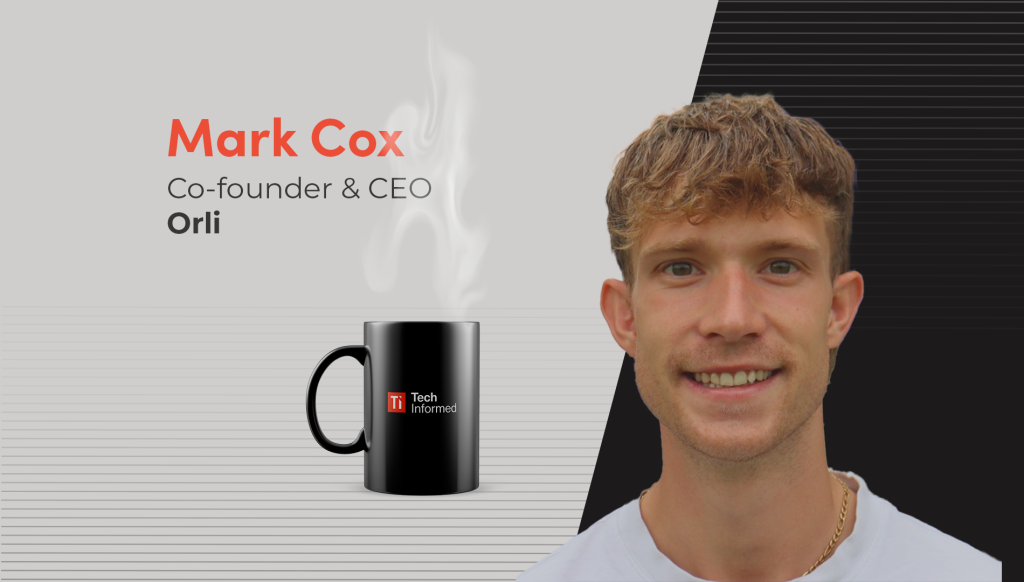

A coffee with… Mark Cox, Co-founder and CEO, Orli
As an accident and emergency doctor in the UK’s busy National Health Service (NHS), Mark Cox has witnessed first-hand the growing impact of mental health challenges on young people. Together with co-founder Euan Bell, he…
As an accident and emergency doctor in the UK’s busy National Health Service (NHS), Mark Cox has witnessed first-hand the growing impact of mental health challenges on young people.
Together with co-founder Euan Bell, he launched Orli Health, a digital platform designed to support children’s mental wellbeing through playful, proactive tools, while providing insights to help parents and teachers offer timely support.
The app uses games and a digital twin avatar to help children build emotional awareness and self-regulation skills. It recently secured £60,000 in funding.
As part of Mental Health Awareness Week, TI speaks to Cox about the journey to co-founding Orli and how technology can reshape mental health support for the next generation.
What inspired you to co-found Orli?
I had experienced this period of burnout. I’d gone from being a confident person to waking up most days feeling anxious.
I did a deep dive into who I was and what I wanted out of life, and found that potentially it was something to do with my career.
About a year later, I was working in A&E and saw people coming in through the door with both physical and mental health challenges. I remember a young boy, about 13, who had self-harmed. I sat and chatted with him, got to understand his story, spoke with his parents, and felt like there’s probably something more we could be doing around mental health provision.
So, it was a combination of personal and professional experience. My co-founder Euan has worked in social care, so he’s worked in children’s homes and education settings. After a few coffees and a few beers, we decided it would be a good idea to try to create something new for families and for young people like the boy I met in A&E.
How was it clear that there was a gap for children and mental health support?
NHS data says that one in five young people now have a mental health condition, up from about one in nine in 2017. And CAMHS (Child and Adolescent Mental Health Services) waiting lists, particularly during the pandemic, reached record highs, with 40,000 young people in the UK waiting over two years for mental health support.
The NHS system is set up in quite a reactive way. People are waiting until there’s a problem before they can get help. Some people need support, but when they try to access it, they’re faced with either long waiting lists or, in the private sector, high costs.
We need to shift towards making support more aspirational and engaging for young people, and help them look after their minds and emotions proactively.
How does Orli work to aid in this?
Orli is built around the question: What if emotional support were more like play and less like therapy? How can we create something engaging and aspirational for children, while also supporting teachers, schools, parents, and the wider systems around them?
So, Orli is a gamified digital platform that helps children build emotional flexibility and skills, while also providing data, more importantly, insights and tools, to the people who support them.
We’re currently building out a platform with a hybrid approach, which means a digital and hands-on programme of support for schools, initially targeting seven to 11-year-olds. It also includes support for schools to better manage and understand children, and support for parents at home.
Will AI factor into the platform?
The way we see AI developing is through a companion – the child creates a digital avatar, which is a representation of themselves. This helps them understand their emotions. They play mini games with the avatar, go on missions, and eventually interact with other avatars in what we’re calling the “Orliverse.”
These avatars are trained on real people to some extent, with their own stories and psychological grounding. But I want to be clear: AI is still an emerging technology, and we’re dealing with young people.
So, we’re not building a system where a child just sits and talks to an AI chatbot. We’ll integrate AI gradually. That’s why we’re leading with gamification. The AI will come a bit later.
That said, the AI component for teachers and parents will function more like a chatbot. It will use the information gathered in the app, so a parent might ask, “What do I do if my child is having a panic attack?”, and receive a helpful, safe, and trusted response.
Using AI as a therapist has become a hot topic. Why do some people prefer to use bots?
I think there are lots of reasons. I saw the other day that therapy is now the third most common use case for ChatGPT, which is huge.
You can personalise AI to respond in a way you like, and you get consistency. There’s also the accessibility and affordability.
The key is that AI should be an enhancer, not a replacement.
It can improve access to care and support what happens between therapy sessions. It can also free up therapists to spend more time with people who need human-led support.
In many cases, people using AI for mental health support might not have gone to therapy anyway. If it’s validated, then I’m optimistic.
How has the concern around social media exposure and young people motivated you?
The way I see it, digital is here to stay. Young people spend five hours a day on screens. Nine out of 10 young people would say they’re gamers.
There’s a counter movement calling for a total removal of screens, but I think that’s unrealistic for most families. Instead, we want to champion digital as a means of connection, development, and real-world benefit.
We want to position ourselves as tech that can be good, and is good, when used appropriately.
How do you take your coffee?
I like an oat cappuccino. I love having coffee in the morning with my girlfriend, or with new people I haven’t met before. That’s one of my favourite things to do.
Founders often tell us how busy they are, but you also work A&E shifts on top of that! How do you take care of your own wellbeing?
I used to be very good at getting up, doing some meditation and going to the gym every day, but in the last year life has got very busy as a founder.
That said, I do lots of things to look after myself. I spend time with people that I love. I think that’s the most important thing at the end of the day, and engaging in something that really lights you up. So I’m building something I care about so much, and I think is needed in the world, so that makes me happy, as much as it is stressful and busy.










